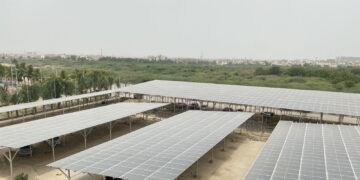Karachi – July 16, 2025: The Institute of Cost and Management Accountants of Pakistan (ICMAP) has called on the government to strengthen and scale up the newly introduced Climate Support Levy by adopting global best practices in carbon pricing. This, the Institute notes, is crucial for tackling climate change, mobilizing green financing, and enabling Pakistan’s transition to a low-carbon economy.
Introduced through the Finance Act 2025–26 and effective from July 1, the Climate Support Levy imposes a charge of Rs. 2.50 per liter on petroleum products such as petrol, diesel, and furnace oil. While ICMAP acknowledges this as a significant policy shift, it stresses the need for a clear, long-term pricing roadmap and broader sectoral coverage to maximize the levy’s impact. The levy aims to discourage fossil fuel use while generating dedicated revenue for renewable energy, green infrastructure, and climate adaptation projects. A complementary measure—the New Energy Vehicles (NEV) Adoption Levy—also places a small charge on conventional vehicles, while exempting electric, hybrid, and hydrogen-powered models, to support the shift to clean transport.
Citing successful international models, ICMAP points to Singapore’s phased carbon tax approach, Sweden’s high-rate carbon pricing, and innovative strategies from Chile and Malaysia. These countries illustrate how both developed and developing economies are using carbon pricing tools—ranging from direct taxes to voluntary carbon markets—to drive down emissions and finance sustainable growth.
Based on these examples, ICMAP recommends a set of targeted reforms to enhance the effectiveness of Pakistan’s Climate Support Levy. These include adopting a phased pricing plan that gradually raises the levy to Rs. 10 per liter by 2030; extending the levy’s coverage to include high-emitting sectors like industry and power; and allowing businesses to partially offset their levy liabilities through investment in verified domestic carbon reduction projects.
To operationalize such a system, ICMAP proposes the establishment of a Pakistan Carbon Exchange—a transparent platform for trading carbon credits, modeled on Malaysia’s voluntary carbon market. The Institute further advises that vulnerable sectors, such as exporters and energy-intensive industries, receive transitional support to maintain competitiveness and prevent carbon leakage. In addition, the promotion of nature-based solutions—such as reforestation, wetland restoration, and soil carbon programs—can provide both environmental and socio-economic benefits.
Crucially, ICMAP emphasizes that revenues collected from the levy should be transparently reinvested in clean energy projects, low-emission transport systems, and targeted social protection measures. This will help build public trust and ensure a just and inclusive transition for all segments of society.
With sound design and strong implementation, the Climate Support Levy has the potential to become a central pillar of Pakistan’s green development agenda. ICMAP reaffirms its commitment to supporting the government with technical expertise in fiscal policy, cost accounting, and climate finance. A well-structured levy, aligned with international best practices, can help reduce emissions, attract sustainable investment, improve trade competitiveness, and strengthen climate resilience across the country.

















